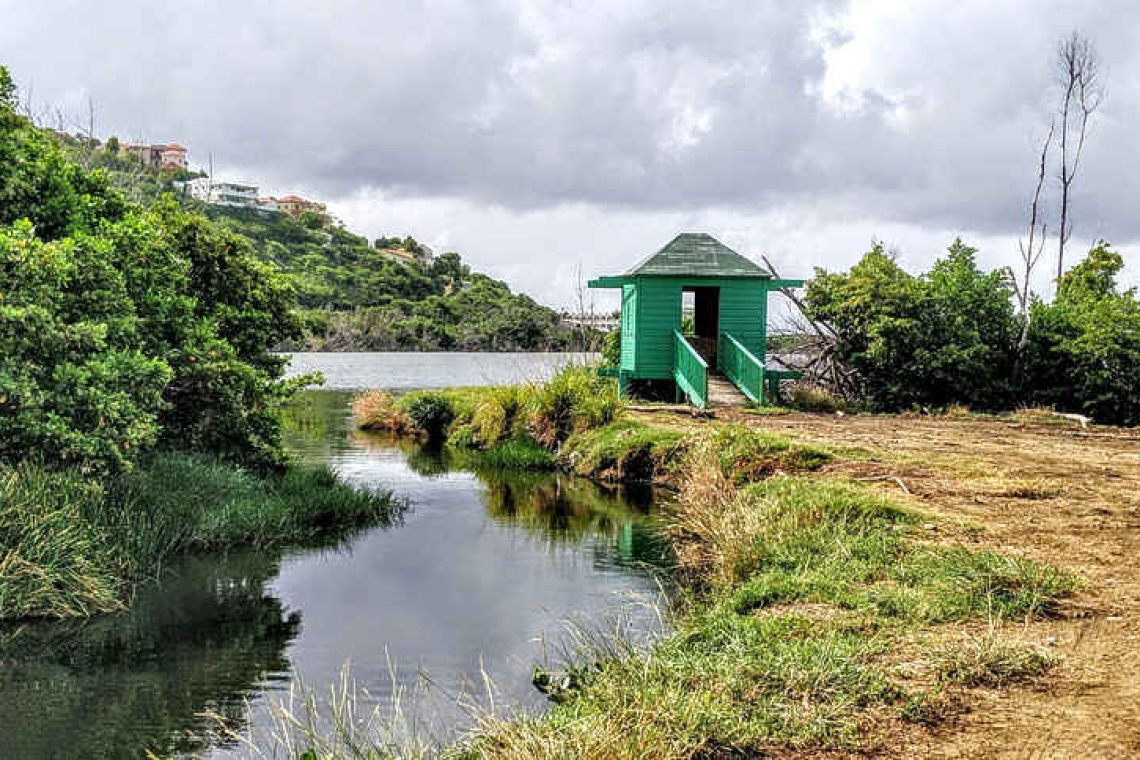Bird-watching cabin at Little Bay Pond, which is surrounded by mangroves. This natural habitat is under threat from upcoming development, including a restaurant and entertainment venue built into the pond and walkways cutting through the remaining mangroves.
PHILIPSBURG--With World Mangrove Day this past Saturday, July 26, the Dutch Caribbean Nature Alliance (DCNA) is sounding the alarm: mangroves—nature’s coastal guardians—are under serious threat across the region.
Found only on Aruba, Bonaire, Curaçao, and St. Maarten, these salt-tolerant forests are among the most powerful ecosystems in the Dutch Caribbean. They absorb up to 10 times more carbon than tropical rainforests, shield coastlines from erosion and storms, and serve as vital nurseries for countless marine species.
Yet across the islands, mangroves are declining rapidly. According to experts, there is still hope—if bold action is taken now.
The State of Nature Report Caribbean Netherlands, recently published by Wageningen Marine Research and funded by the Ministry of Agriculture, Fisheries, Food Security and Nature LVVN, paints a disturbing picture. The report identifies coastal development, poor water management, erosion, and sedimentation as the primary threats to mangrove ecosystems.
On Bonaire, key mangrove zones like Lac Bay and Lagun are experiencing severe ecological decline due to disrupted water flows and sediment build-up that suffocates mangrove root systems. Although the study focused on Bonaire, similar environmental challenges have been observed in Aruba, Curaçao, and St. Maarten.
Mangroves are essential for both climate resilience and biodiversity. From storm protection and carbon storage to supporting fisheries and local economies, their value is immeasurable. The report is unequivocal: without immediate and sustained intervention, these ecosystems—and the protection they offer—could be lost.
The Ministry of LVVN plays a central role in environmental protection in Bonaire, Saba, and St. Eustatius, as outlined in the Nature and Environmental Policy Plan Caribbean Netherlands (NEPP) 2020-2030. In recent months, DCNA and its partners, including WWF-NL and local conservation organizations, have called for urgent action and substantial funding to meet NEPP’s 2030 targets.
A joint statement from these groups estimates that an additional €300 million is needed to achieve the NEPP’s goals. Approximately half of that is earmarked for the direct conservation and restoration of ecosystems such as mangroves, coral reefs, and forests. The other half would go toward upgrading vital environmental infrastructure, including wastewater treatment systems.
While the investment is significant, experts warn that delaying action will only lead to higher costs and deeper environmental damage in the future.
Although much of the current policy focus is on the Caribbean Netherlands, the other Dutch Caribbean islands—Aruba, Curaçao, and St. Maarten—also face increasing ecological threats and urgently require more support. DCNA is advocating for a coordinated regional approach and more equitable distribution of funding across all six islands.
With support from the Dutch Postcode Lottery, WWF-NL, and Bloomberg Philanthropies, DCNA is launching the Conservation and Restoration of Key Habitats Programme. The regional initiative aims to scale up restoration efforts, strengthen environmental policy and enforcement, and integrate habitat protection into land use and climate plans.
“Mangroves are one of nature’s most effective shields against climate change and biodiversity loss,” DCNA stated. “If we lose them, we lose much more than trees—we lose protection for our people, our coastlines, and our marine life.”
However, with joint action, there is still time to reverse the trend. By prioritizing conservation and regional collaboration, mangroves can recover and continue to protect life both above and below the waterline.







